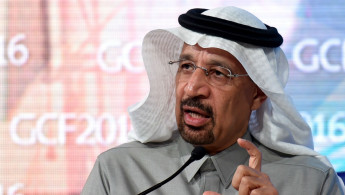Saudi Aramco IPO 'still on track' for 2018
Saudi Arabia's oil minister has tried to reassure the country and possible investors about rumours emerging this week that a planned IPO of state-owned oil giant Aramco could be shelved.
2 min read
Oil minister Kahlid al-Falih declined to comment on speculation about Chinese interest in Aramco [AFP]
Saudi Arabia is still on track to complete the initial public offering (IPO) of portions of state oil company Saudi Aramco in 2018, Oil Minister Khalid al-Falih said on Tuesday.
The oil minister's remarks follows increased speculation in recent days that Riyadh is considering shelving or scrapping the international IPO.
"The IPO is on track," al-Falih was quoted by Bloomberg as saying on the sidelines of the annual dinner of the Oil & Money conference in London. "We will announce the venue in due course."
When asked whether both the local and international phases of the IPO will go ahead next year, al-Falih replied, "yes of course". He declined to comment on whether Chinese investors were looking to buy shares as cornerstone investors ahead of the IPO.
According to sources quoted by Reuters on Monday, Chinese investors who are part of a state-run consortium are attempting to purchase five percent of the oil giant. If agreed, this deal would effectively cancel the IPO.
Sources familiar with the IPO also said earlier this week that the international offering could be delayed until at least 2019.
Riyadh announced the IPO as part of an economic reform programme that aims to diversify Saudi Arabia's economy away from reliance on oil, amid low prices for the commodity and wider economic uncertainty.
While the prospect of holding a stake in the kingdom's prized oil enterprise has whet the appetites of international investors, many within Saudi Arabia believe that Riyadh is selling shares cheaply to counteract falling oil prices.
Saudi Arabia has valued Aramco at around $2 trillion, meaning that the five percent stake it plans to sell could raise as much as $100 billion.
Analysts, however, have disputed this valuation, giving far lower estimates than Riyadh.
Saudi Arabia has valued Aramco at around $2 trillion, meaning that the five percent stake it plans to sell could raise as much as $100 billion.
Analysts, however, have disputed this valuation, giving far lower estimates than Riyadh.





 Follow the Middle East's top stories in English at The New Arab on Google News
Follow the Middle East's top stories in English at The New Arab on Google News


